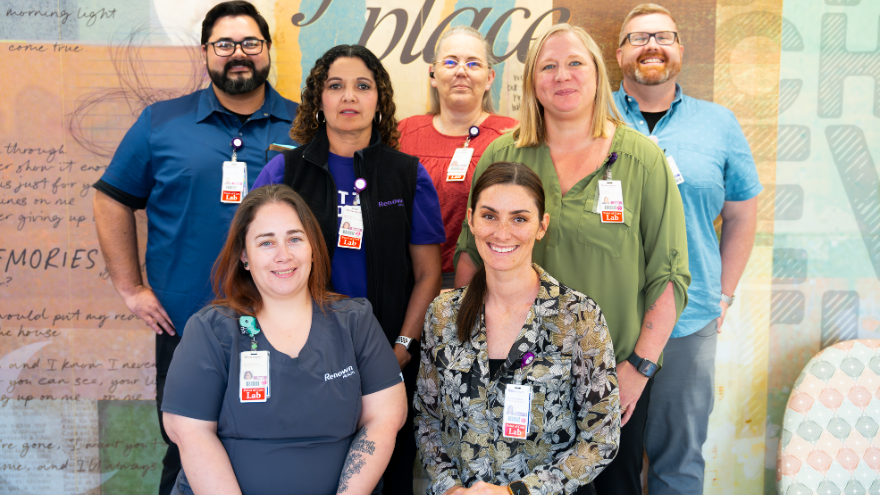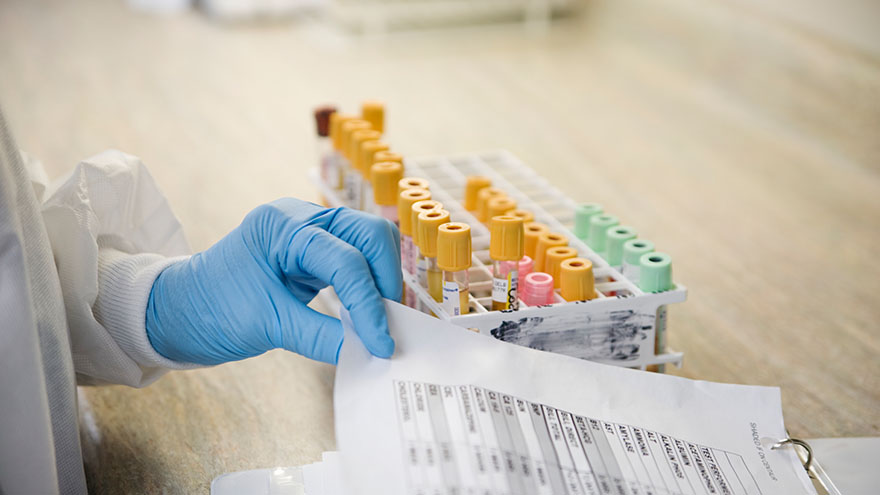Search
Results for 'primary care'
Clear-
Department Spotlight: Point-of-Care
When you visit your provider for your annual exam or to address a health concern, or if you’re admitted to the hospital for any reason, lab draws – including blood tests, urine samples and saliva swabs – are common. When it comes to lab draws when you’re sick with a virus, such as strep, flu, RSV or COVID, or routine tests for chronic conditions, such as blood glucose or hemoglobin A1C, the last thing you’d want to do as a patient is wait a long time to get your results back. You’re focused on getting your results, receiving the proper medication and feeling better as soon as possible. Luckily for patients at Renown Health, we have a talented team to meet that need. Meet the Point-of-Care team at Renown, an important subset of the larger Core Laboratory department. With decades of collective experience in the field and some of the finest point-of-care technology at their fingertips, this team works with our healthcare teams to ensure you have access to fast, accurate test results to help you on a quicker road to recovery. Pointed Towards Efficient Solutions Point-of-care testing can be defined as exactly how it sounds – lab testing at or near the patient or their care area, otherwise known as “at the point-of-care.” While our clinicians utilize this specialized equipment every day for point-of-care testing on patients, they rely on the Point-of-Care department for training, everyday guidance, quality checks, audits and leadership. At Renown, Point-of-Care testing is used in nearly every nursing unit across our hospitals and 53 outpatient care locations, including primary care, urgent care, pediatrics and women’s health – alleviating some of the workload of our central lab. Because so many teams rely on this crucial technology and test processes, this team accomplishes a great deal each day, from checking equipment to ensuring test accuracy. “Our day starts early, with our first team member opening the department at 5 a.m. and circulating on the nursing units to address broken point-of-care equipment issues or supply shortages that could impact patient testing,” said Joni Boury, Lab Program Coordinator. “Once the point-of-care scientists arrive, they will address any charting issues that arose overnight and ensure all test results are correctly charted in Epic. After critical issues are addressed, we visit the testing locations and performing audits to ensure all testing equipment is functioning, clean and being appropriately maintained.” In order to provide these efficient tests – in minutes! – to patients anxiously awaiting their results, our first step is to make sure our equipment and processes are up-to-code. Point-of-care testing is regulated at both the state and federal levels, and this team never leaves a checkbox unmarked when it comes to testing regulations. “As a part of the ambulatory side of the Point-of-Care team, I make sure that state and federal licensing is maintained so the practices that perform these tests can continue to perform in-office testing for patients,” said Wende Lane, Clinical Lab Assistant Lead. “I also round in these practices to make sure they are adhering to state and federal guidelines, as well as Renown policies.” And it’s not just existing equipment that needs oversight – the Point-of-Care department also implements new equipment and processes across Renown. These team members are expert jugglers when it comes to this effort, handling training, collaborating with leaders, recommending the proper placement of equipment and much more. "Each day, we work on our many deployments scheduled throughout the hospital and outpatient locations,” said Joni Boury. “That work includes meeting with leaders to ensure new spaces are correctly built to accommodate the point-of-care devices, configuring new equipment, training new leaders and device operators and ensuring appropriate ordering and charting of the test results.” “In being able to perform these tests in the outpatient setting instead of having to send them somewhere else for a test, providers can begin treating their patients within a matter of a few minutes, rather than hours,” added Wende Lane. For a small-but-mighty team of six employees, the heights this team reaches knows no bounds. They’ve celebrated many achievements and expansions this year, including offering new-and-improved PCR testing across various outpatient practices. “Our team has had several notable accomplishments over the past year,” said Breanna Van Dyck, Medical Lab Scientist and Lab Program Coordinator. “We successfully rolled out a massive Cepheid PCR testing initiative to over 30 Renown outpatient locations within the community. This expansion significantly improved our testing capacity and accessibility and will help ensure timely and accurate diagnostic tests for respiratory viruses and strep to a broader patient population, including our rural practices.” By combining cutting-edge technology with compassionate patient care, our Point-of-Care team members are essential to contributing to Renown’s goal of providing efficient, high-quality care tailored to each patient’s individual needs. Take a Point-of-Care Tour! The Point-of-Care department covers a lot of ground around Renown, reaching Reno, Sparks, Carson City, Fernley and Fallon. Take a glance at the photo carousel below to put yourself in the shoes of our Point-of-Care team members on a regular day!
-
Understanding Your Risks for Fatty Liver Disease
Did you know that about one in four adults and one out of every ten kids in the U.S. might have a liver problem called non-alcoholic fatty liver disease (NAFLD)? This happens when too much fat builds up in the liver, and it's not because of drinking alcohol. The most serious type of this liver problem is called metabolic and non-alcoholic steatohepatitis (M/NASH). It means there's damage and can be scarring in the liver. About 20% of people with fatty liver disease have M/NASH. What's worrying is that many people don't even know they have it. Dr. Catherine McCarthy, a family medicine doctor at the University of Nevada, Reno School of Medicine, talks about the main risks of M/NASH and how you can check your risk for liver disease during Liver Health Matters Month, or anytime. Who Might Get M/NASH? Doctors aren't sure exactly why some people get fatty liver or M/NASH. While anyone can get M/NASH, people who might be more at risk include those with: Type 2 diabetes Insulin resistance or prediabetes High body mass index (BMI) or obesity High cholesterol or other fats in the blood High blood pressure Signs of liver problems from tests or biopsies A family member living with M/NASH How Do Doctors Find Out If You Have M/NASH? Doctors can do different checks and tests to see if someone has fatty liver or M/NASH. They might look at your liver health through non-invasive tests such as blood work, ultrasounds or MRIs. They might also suggest a special blood test called an Enhanced Liver Fibrosis (ELF) test– offered at no-cost through the Healthy Nevada Project – to check your risks of advancing liver disease. How Can You Treat Fatty Liver Disease or M/NASH? Patients with moderate to advanced liver scarring may also be prescribed a recently approved therapy called Rezdiffra. However, prevention of advancing disease is still the best option. Actions you can take to improve your liver health and reduce your risk include: Eating healthy, especially low-carb foods Exercising regularly Losing weight if needed Not drinking alcohol Keeping an eye on blood sugar if you have diabetes No-Cost Liver Screening Through the Healthy Nevada Project If you live in Nevada and are 18 or older, you can qualify for a no-cost liver health screening by enrolling in the Healthy Nevada Project, one of the largest community-based population health studies in the entire country. This study helps doctors understand your liver health better and plan early treatments to stop liver disease from getting worse. By joining the Healthy Nevada Project, you can: Get the FDA-approved ELF test to check your risks for liver disease See your test results in your medical record to help your doctor plan your care better Help doctors and researchers learn more about M/NASH and work on future treatments Participate in genetic sequencing for high-risk conditions linked to heart disease and certain cancers, including breast and ovarian cancer Gain high-level health insights, including food sensitivities, and ancestry information. Enrolling in the study is easy: Schedule a Virtual Consent Appointment through MyChart where a study representative will answer any questions, confirm your eligibility and sign you up. Once you’re signed up, your representative will schedule your blood test. Go to your blood draw appointment. By taking part in this study, you're helping to make a difference in liver health research!
Read More About Understanding Your Risks for Fatty Liver Disease
-
A Blood Test: What Valuable Clues It Tells Your Doctor
Blood. It can make you squeamish to think about it, yet every drop is vital to your health. In fact, a tiny vial of it can tell your doctor a wealth of information. We asked Benjamin Hansen, M.D., to explain what providers can learn from a blood test and why it’s important to get one as part of your annual checkup. CBC, the initials, sound innocent enough, right? In fact, when your favorite TV doctor orders a CBC, or complete blood count, it’s often the first step in getting an overall picture of your health. "It primarily measures white blood cells, red blood cells and platelets," explains Hansen. Although a blood test is one test you don’t have to study for, the measurements it takes can point to a host of information. What a Blood Test Says About Your Health White Blood Cell Count "The white blood cell count in your CBC helps us to determine the strength of your immune system," says Hansen. "It also helps us to determine the likelihood of infection because white blood cells fight off infection. Knowing the white blood cell count can also be helpful in patients with compromised immune systems, such as those on certain medicines or with conditions that impair immunity," he adds. White blood cells are made in your bone marrow and are alive only one to three days. Therefore, your body is constantly making them. Red Blood Cell Count "The red blood cells carry oxygen from your lungs throughout your body, while also carrying away waste. The hemoglobin (red blood cell protein) count is important because it helps us determine how well you're able to deliver oxygen from your lungs to the rest of your body," states Hansen. If these counts are low, you may have trouble breathing or experience fatigue. Red blood cells also grow in bone marrow, but they have a long lifespan – generally 100 to 120 days. Why Get a Blood Test? Although the CBC is just one type of blood test, according to the National Institutes of Health (NIH) there are a number of blood tests available that can help check for diseases and conditions such as: Heart disease Cancer Anemia (low iron) Diabetes High cholesterol Alcohol or Drug use disorder HIV/AIDS Additionally some tests show how well your kidneys, liver, heart and other organs are working. If you are taking a medication, a blood test can also let your provider know if it is helping you. What to Expect From a CBC Blood Test When you are not feeling well, it may take some detective work to figure out what is wrong and sometimes a CBC can be helpful. With this in mind, a lab order from your provider is needed to order a CBC blood test. Some blood tests require you to not eat food (fast) eight to 12 hours before the blood draw. Your provider will let you know the type of blood test(s) they are ordering for you. Usually it's important to drink plenty of water before your blood test, to make it easier to locate your veins. Generally a small sample of blood is taken from your arm vein and then sent to a lab for analysis. Discussing Your Results "A CBC can help your provider determine if there is an infection, your level of immunity, if you are anemic or if you are prone to bleeding," says Hansen. When to Get a Blood Test "A CBC is usually ordered for a specified purpose. If you think you might need a CBC, please call your provider. It's also important to see your provider regularly to keep an eye on your health. Many patients should see their provider at lease yearly," Hansen clarifies.
Read More About A Blood Test: What Valuable Clues It Tells Your Doctor


